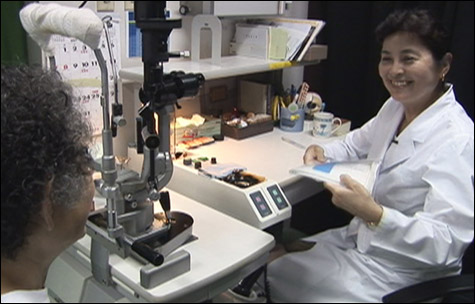
“NOT BAD” In Japan, the hospitals run at a deficit, but patients receive excellent care and pay almost nothing. |
“In America,” says Hong-Jen Chang politely, “it’s not really a . . . a system you can copy. It’s a market. So if you let things happen, it will be like the United States.” It doesn’t take much to indict American health care — one or two statistics will usually suffice, or a single anecdote — but somehow the gentle clarity of this observation is more damning than a heap of journalistic anathemas. Hong-Jen is one of the officials who, in the late ’80s, was tasked with the overhaul of the Taiwanese health-care system. As T.R. Reid, host/narrator of Frontline’s Sick Around The World (WGBH Channel 2: Tuesday at 9 pm), puts it in his storytelling style: “When Taiwan got rich, the government said, ‘Wait a minute, we need a rich country’s health-care system!’ So you know what they did? They set up a committee and they looked all over the world at different health-care systems, looking for good ideas, and then designed their own.”
Not exactly “The Princess and the Pea,” is it? But as someone easily perplexed by economic data, I rather appreciate Reid’s folksy educative manner. Aghast at the slo-mo fiasco of the US system (47 million people without coverage, extortionate drug prices, hundreds of thousands driven into medical bankruptcy each year), Reid, a veteran reporter for the Washington Post, saddles up and heads for the horizon in search of a better way. In England, where you never have to pay a penny in health expenses but might end up waiting months for a hip replacement, he meets Dr. Badat. “Dr. Badat has personal experience with US medicine,” Reid tells us. “He had a heart attack while on vacation in Las Vegas and was rushed to the county hospital.” Dr Badat is a large, slow-moving man with dancing eyes whose potential susceptibility to Vegas overload is quickly sensed. He has nothing but praise for the doctors there: the treatment he received was “absolutely fantastic.” The bill, however, came to $67,000. “That,” pronounces Dr Badat, “is preposterous.”

To Japan next, where the health-care market is closely — even tyrannically — regulated, an average doctor’s visit lasts three to five minutes, and Reid gets the chance to flex his Japanese. What do the elderly persons in the waiting room think of their system? “Well it’s not bad as a matter of fact,” muses one old man. “You can’t call it bad.” And really, you can’t: patients receive excellent care, for almost nothing. Who cares if 50 percent of the country’s hospitals are running a deficit? Reid visits Germany, where we learn — or I learn, at least — that it was “Iron Chancellor” Otto von Bismarck, whom I had previously associated with huge moustaches and acts of war, who “invented the concept of health-care systems.” Then to Taiwan, and finally to Switzerland, where Reid asks President Pascal Couchepin how many people a year go bankrupt because of medical expenses. “Nobody,” replies Couchepin crisply. “Doesn’t happen. It would be a huge scandal if it happens.”
I’ll leave you to discover for yourself the nature of Reid’s conclusions, and his verdict on the various health-care proposals of our current candidates. What you’ll take away from Sick Around the World is the impression that the most common-sense ideas about health care — the notion, for example, that everyone should get it, and that you don’t lose it if you lose your job — are, to our ears, sufficiently heretical that they can be uttered only in a Taiwanese, German, or Swiss accent.